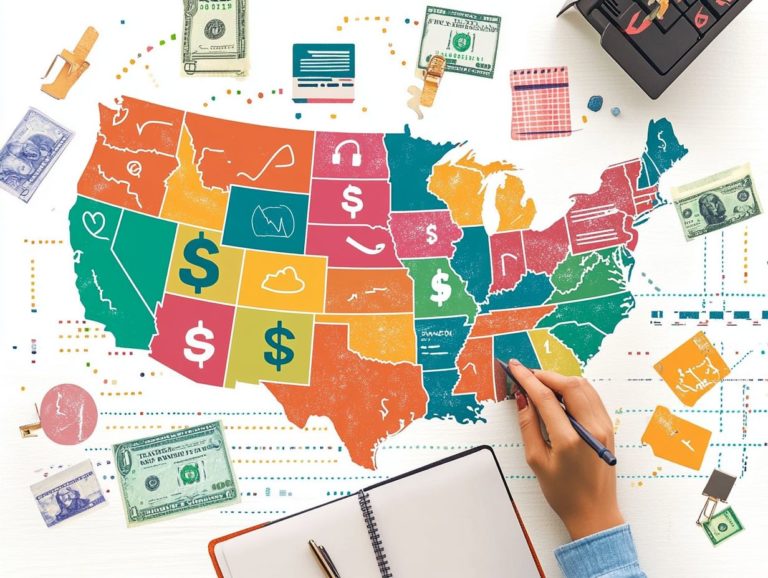Freelancer Tax Strategies for Increased Savings
Navigating the world of freelancer taxes may seem daunting. However, grasping your obligations and opportunities is crucial for your financial success.
This article delves into essential topics, covering the taxes you need to pay, common deductions you can claim, and effective tax planning strategies tailored just for you.
You ll also discover the significance of accurate record-keeping, the benefits of collaborating with an accountant, and how to manage your estimated quarterly taxes like a pro.
We’ll also explore retirement planning options and share valuable tax tips designed to maximize your savings.
Join us on this journey as we simplify your financial landscape and empower you to make the most of your freelance income.
Contents
- Key Takeaways:
- Understanding Freelancer Taxes
- Maximizing Deductions
- Tax Planning for Freelancers
- Keeping Accurate Records
- Working with an Accountant
- Estimated Quarterly Taxes
- Retirement Planning for Freelancers
- Tax Tips for Freelancers
- Frequently Asked Questions
- What are some common freelancer tax strategies for increased savings?
- How can good records help with freelancer tax strategies?
- What deductions and credits can freelancers use for tax savings?
- Why should freelancers manage their income and expenses year-round?
- Are there specific tax strategies for freelancers working from home?
- What should freelancers think about when choosing a retirement plan?
Key Takeaways:

- Understand the different types of taxes that freelancers need to pay to avoid any surprises come tax season.
- Maximize your tax deductions by keeping accurate records and utilizing common deductions for freelancers leading to increased savings.
- Plan ahead and work with an accountant to strategize ways to lower your tax burden and save money, such as paying estimated quarterly taxes and considering retirement savings options.
Understanding Freelancer Taxes
Grasping the intricacies of freelancer taxes is essential for anyone embarking on a self-employed journey. This landscape involves navigating the complexities of tax obligations set by the IRS.
These include self-employment taxes and a variety of tax deductions.
You need to be aware of your responsibilities, which encompass not just income taxes but also the subtleties of quarterly payments and strategic tax planning that can enhance your financial standing.
Turning to resources and experts like Ugur Kaner and Stephen Fishman can be a game-changer. They offer invaluable tax insights that enable you to manage your taxes with confidence and efficiency. Additionally, following tax tips for freelancers in the gig economy can further enhance your financial strategy.
What Taxes Do Freelancers Need to Pay?
As a freelancer, you re required to navigate various taxes, including income taxes, taxes you pay as a self-employed person, contributions to Social Security, and Medicare, all governed by IRS regulations.
To stay compliant, it s important to track your earnings meticulously and file your returns punctually. Staying organized will give you peace of mind and keep your finances in check!
Calculating your taxes can be intricate, as it combines both Social Security and Medicare taxes at a rate of about 15.3% on your net earnings. Neglecting these obligations could result in severe penalties, back taxes, and interest charges not to mention the looming risk of audits.
The IRS plays a pivotal role in enforcing these regulations. They provide stringent guidelines and mechanisms to monitor freelancers, highlighting the critical importance of understanding and adhering to your tax responsibilities. For creative freelancers, knowing the 5 essential tax tips can make a significant difference in managing your finances.
Maximizing Deductions
Maximizing deductions is crucial for freelancers who want to effectively reduce taxable income. A range of tax deductions is available for everyday business expenses, including office supplies, travel costs, and the home office deduction.
Leveraging these can significantly lower your overall tax liability, allowing you to keep more of your hard-earned money.
Common Deductions for Freelancers
As a freelancer, you have access to several common deductions that can greatly reduce your taxable income. Think business mileage, home office expenses, advertising costs, and office supplies all of which can work wonders for your finances when documented properly.
It’s crucial to stay diligent in tracking these expenses throughout the year. For example, maintaining a meticulous mileage log for your car travels or keeping all your receipts for office supplies can make the tax filing process much smoother.
Consider using accounting software or apps to simplify this tracking process. They allow you to easily categorize and organize your business expenses without the headache.
When it comes time to claim these deductions, be prepared to present supporting documents like invoices, bank statements, and receipts. This way, you can ensure that all your entries are accurate and verifiable in case of an audit.
Start tracking your expenses today to maximize your savings come tax time!
Tax Planning for Freelancers
Effective tax planning as a freelancer means using a range of strategies designed to minimize your tax burdens, optimize your savings, and ensure that your quarterly payments are timely. Don’t overlook how your retirement accounts can shape your financial future!
By taking a proactive approach, you can navigate the complexities of tax obligations with confidence and secure a more stable financial future.
Strategies for Lowering Tax Burden

Strategies for reducing tax burdens as a freelancer include using tax-saving methods like contributing to retirement accounts and Health Savings Accounts (HSAs). HSA contributions can lead to additional deductions.
By taking advantage of these accounts, you can significantly lower your taxable income while planning for your future financial stability. For example, contributing to a Solo 401(k) or a SEP IRA allows you to maximize your retirement savings and decrease your current-year taxes, as these contributions are often tax-deductible. To learn more about optimizing your tax benefits, check out Maximizing Deductions: A Freelancer’s Guide.
HSAs also provide a triple tax advantage: contributions reduce your taxable income, funds grow tax-free, and withdrawals for qualified medical expenses are also tax-free. To effectively implement these strategies, consult a tax professional who can help ensure compliance and determine the optimal contribution levels for your situation, as well as guide you on how to save for taxes as a freelancer.
Setting up automatic deposits for your HSA contributions can simplify the process, making it easier for you to stay consistent throughout the year.
Keeping Accurate Records
Maintaining accurate records is essential for freelancers. Effective record-keeping not only enables you to track your expenses efficiently but ensures all deductible business costs are thoroughly documented.
This meticulous approach is vital for minimizing your tax liability and optimizing your financial standing.
Importance of Record-Keeping for Taxes
The significance of record-keeping for taxes is paramount; maintaining accurate records of your business expenses is crucial for claiming tax deductions and adhering to IRS regulations.
Diligent record-keeping not only streamlines the audit process where the IRS checks your records but also gives you a clear overview of your financial status. This practice enables you to make informed decisions and effectively track your cash flow.
By organizing your receipts and invoices, you can easily substantiate claims during tax season, ensuring you take full advantage of all available deductions. Ultimately, meticulous record-keeping fosters a proactive approach to financial management, enhancing both your confidence and clarity in your business operations.
Working with an Accountant
Engaging an accountant offers freelancers essential accounting support and professional services. This ensures you receive expert tax advice and effective tax planning tailored precisely to your unique financial circumstances, including managing business insurance needs.
Benefits of Hiring a Professional for Taxes
Hiring a professional for your taxes offers numerous advantages that can elevate your financial strategy. You gain access to expert tax advice, efficient management of deductible expenses, and strategic tax planning that ultimately saves you both time and money.
But it s not just about efficiency; working with tax professionals significantly alleviates stress. They navigate the complex regulations and ensure your compliance with all tax laws, allowing you to focus on what you do best.
These experts bring an unparalleled level of accuracy to your filings, helping to minimize the risk of costly mistakes or audits—an intimidating prospect for anyone not well-versed in tax intricacies. By remaining skilled with the latest tax codes and deductions, they uncover opportunities you might easily overlook, potentially maximizing your returns and reducing your overall tax burden. If you are a freelancer working abroad, you should also consider the tax tips for freelancers who work abroad to ensure compliance and optimize your finances.
This proactive approach benefits you in the current fiscal year and sets a solid foundation for your future financial strategies. Don’t wait consult a tax professional today to secure your financial future!
Estimated Quarterly Taxes
Estimated quarterly taxes are an essential part of your tax planning as a freelancer. You need to make those quarterly payments to the IRS based on your projected income.
This practice not only keeps you in compliance but also helps you avoid any unnecessary penalties down the line.
How and When to Pay Estimated Taxes

As a freelancer, you must know how and when to pay estimated taxes. Quarterly payments are due by specific tax deadlines throughout the year.
Understanding this schedule is vital for effectively managing your finances and steering clear of unnecessary penalties.
The IRS requires freelancers to pay these taxes four times a year, with deadlines typically set for April 15, June 15, September 15, and January 15 of the following year. To navigate these requirements effectively, consider utilizing tax planning tips for new freelancers. You can submit payments through various methods, including convenient online options via the IRS website, electronic funds withdrawal during e-filing, or mailing a check along with a payment voucher.
Timely payment is crucial. Missing these due dates can lead to significant fines and interest charges, ultimately impacting your overall income and cash flow.
Retirement Planning for Freelancers
Planning for retirement as a freelancer is a game-changer for your future! You have a variety of options at your disposal, including an Individual 401(k) and a Simplified Employee Pension (SEP).
Both options help you build your nest egg while offering valuable tax advantages that can enhance your overall financial strategy.
Options for Retirement Savings
Freelancers have an array of retirement savings options, including the Individual 401(k) and Simplified Employee Pension (SEP). Both plans deliver significant tax savings while securing a prosperous financial future.
Understanding the unique features of these plans is crucial. For example, the Individual 401(k) boasts high contribution limits that can soar up to $66,000 if you’re 50 or older, allowing for maximum potential tax-deferred growth.
On the flip side, the SEP IRA offers a more straightforward setup, permitting contributions of up to 25% of your earnings, capped at $66,000 for 2023. This makes it a breeze to manage, especially for those navigating fluctuating incomes.
By carefully considering the eligibility requirements such as income thresholds and business structure you can determine which retirement account aligns best with your financial aspirations and ever-changing revenue streams.
Tax Tips for Freelancers
Tax tips for freelancers can significantly elevate your tax savings potential, allowing you to maximize deductible expenses and make informed financial choices.
By leveraging accounting resources, you can navigate the complexities of your taxes with confidence and clarity.
Additional Ways to Save on Taxes
Exploring additional ways to save on taxes can significantly benefit you as a freelancer. This offers valuable insights into various deductible expenses and strategies that can enhance your tax savings.
One effective strategy is utilizing health savings accounts (HSAs). Not only do they allow for tax-free contributions, but they also serve as a financial safety net for your medical expenses, ultimately lowering your taxable income.
It’s easy to overlook certain deductible expenses, like home office deductions and business-related travel costs, which can accumulate to substantial savings.
By embracing innovative approaches to tax planning such as setting aside funds in retirement accounts like SEP IRAs you can secure your financial future while simultaneously reducing your current tax liabilities.
To navigate these options effectively, seeking professional tax advice is highly recommended. This enables you to maximize your savings while minimizing risks, ensuring that your hard-earned income works as efficiently as possible for you.
Frequently Asked Questions
What are some common freelancer tax strategies for increased savings?

Freelancers can increase savings by keeping track of expenses and income throughout the year. Proper record-keeping ensures you don’t miss out on deductions and credits.
How can good records help with freelancer tax strategies?
Good records are essential for freelancers. They make it easier to report income and claim all possible deductions.
What deductions and credits can freelancers use for tax savings?
Freelancers can claim various deductions like home office expenses and travel costs. You can also include training or skill development costs and retirement contributions.
Why should freelancers manage their income and expenses year-round?
Managing finances throughout the year allows freelancers to adjust their tax strategies. This preparation helps avoid surprises at tax time and maximizes deductions.
Are there specific tax strategies for freelancers working from home?
Absolutely! Freelancers working from home can deduct costs related to their home office. This includes parts of rent or mortgage payments, utilities, and internet costs.
What should freelancers think about when choosing a retirement plan?
When selecting a retirement plan, freelancers need to consider contribution limits and tax benefits. Also, check for any fees related to the plan to find the best fit for your financial situation.






